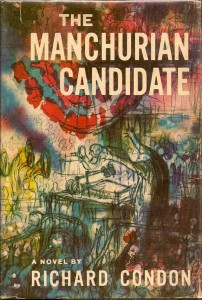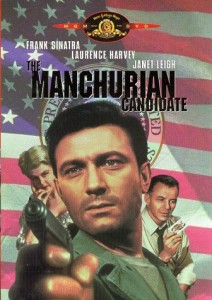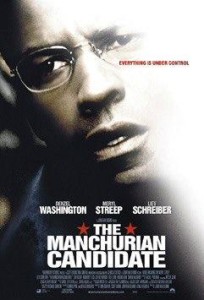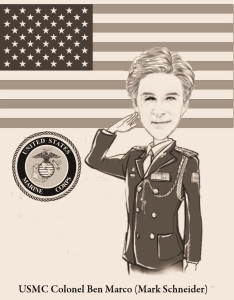Camelot Theatre’s The Manchurian Candidate
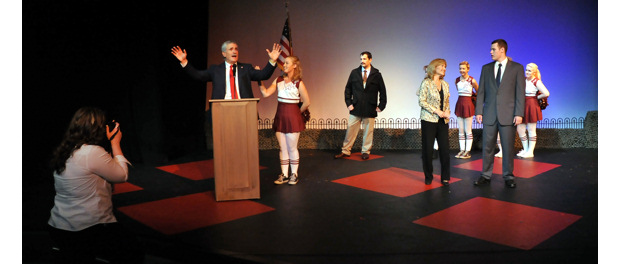 Vice Presidential Candidate Political Rally with (L-R) Journalist (Angela Marthaller), Senator Johnny Iselin (Jeff Golden), Cheerleader (Tessa Alleman), Ivan (Jake Hastings), Mrs. Iselin (Presila Quinby), Cheerleader (Zelda Baldwin), Raymond Shaw (Aaron Garber) and Cheerleader (Sophie Stricker) in Camelot Theatre's production of "The Manchurian Candidate".
Vice Presidential Candidate Political Rally with (L-R) Journalist (Angela Marthaller), Senator Johnny Iselin (Jeff Golden), Cheerleader (Tessa Alleman), Ivan (Jake Hastings), Mrs. Iselin (Presila Quinby), Cheerleader (Zelda Baldwin), Raymond Shaw (Aaron Garber) and Cheerleader (Sophie Stricker) in Camelot Theatre's production of "The Manchurian Candidate".
Camelot Theatre’s The Manchurian Candidate: A Master Class In Fine Acting
– by Lee Greene
In a recent press release announcing auditions for its 2016 season of plays and musicals, Camelot Theatre described itself as “a semi-professional theatre in the Rogue Valley.” At the performance of Camelot’s production of the dramatic thriller play, The Manchurian Candidate, that I recently attended, there didn’t seem to be anything “semi”-professional about the large cast. The leading actors not only were seasoned professionals, but they delivered what amounted to a master class in fine acting across the board. While the large cast on the Camelot stage did include some younger, newer talents, there was not a sub-par performance among them, as they obviously were led and encouraged by the experienced and generous pro’s heading the cast. So cutting to the chase, if you want the bottom line with respect to whether to go see this play, the answer is, if you have any interest in seeing good stage acting at work, YES, do pop for a ticket and see Camelot Theatre’s production of The Manchurian Candidate. Now the details, for those who are interested in more than just a yes/no on splurging to see a play.
First piece of detail: the source novel. The Manchurian Candidate was originally a Cold War era political thriller novel, written by Richard Condon in 1959. In the book, an American infantry platoon is captured in the Korean War and taken to Manchuria, where they are brainwashed to believe that one of them, Sergeant Raymond Shaw, saved their lives in combat. Based on testimonials from the rest of the surviving platoon, Shaw receives the Congressional Medal of Honor and becomes a national hero. Actually, Shaw has been brainwashed and programmed to unawares murder on command, has killed two of his platoon members while in captivity, and is now being used as a sleeper agent to assassinate on command. Making the plot more interesting, his mother, Eleanor Iselin, is a domineering, ruthless political power broker, who has steered her McCarthy-esque husband, Johnny Iselin, to the U.S. Senate and headed to the Vice Presidency. She is also Shaw’s KGB handler and has engineered the whole thing working with the Communists, to position Shaw to assassinate the U. S. President, elevating Iselin to the office and in effect executing a coup d’etat overthrowing the U.S. government. The fly in the ointment is that several of the members of Shaw’s platoon, most notably the platoon’s leader, career soldier Major Bennet Marco, have been having nightmares – all having the same nightmare, of Shaw murdering his fellow platoon members, instead of saving their lives in combat. Marco pursues this troubling anomaly to its logical conclusion, discovers the plot and intercedes. The plot capitalizes heavily on the Cold War anti-communist paranoid fears of the era, and exploits those emotions to build a compelling dramatic thriller.
Second piece of detail: the 1962 film. The novel was made into a 1962 film by John Frankenheimer that largely adhered to the plot of the novel (though the film did leave out a number of sexual themed subplots in the book, including Mrs. Iselin’s sexual attraction to and coupling with her son, and Shaw’s overactive sex life after his brainwashing) and again exploited the Cold War paranoia of the time. The film, which starred Laurence Harvey as Shaw, Frank Sinatra as Marco, and Angela Lansbury as Eleanor Iselin in an Academy Award-nominated performance, is considered a classic of the political thriller genre. [Wikipedia, The Manchurian Candidate, https://en.wikipedia.org/wiki/The_Manchurian_Candidate] The movie was so successful that the phrase, “’The Manchurian Candidate’, has entered everyday speech as shorthand for a brainwashed sleeper, a subject who has been hypnotized and instructed to act when his controllers pull the psychological trigger.” [Roger Ebert, The Manchurian Candidate, http://www.rogerebert.com/reviews/great-movie-the-manchurian-candidate-1962]
Third piece of detail: the passage of time and demise of the Cold War. The problem which arose over time is that the Cold War ran its course and subsided into the recesses of history, taking it’s hyper-paranoia with it. Younger generations of Americans not only haven’t experienced that heightened fear of Communist perfidy, they may not even be familiar with the conflict at all, so the thriller begins to lose its thrill. In an effort to update the story to have some meaning and relevance in the post Cold War world, the novel was adapted twice more, in updated adaptations eliminating most of the Cold War aspects of the story and replacing them with more contemporary combat and political contexts.
The story was again adapted into a film in 2004, by Jonathan Demme, starring Liev Schreiber as Shaw, Denzel Washington as Marco, and Meryl Streep as Eleanor Iselin. “The film updated the conflict (and brainwashing) to the Persian Gulf War in 1991, emphasized the science fiction aspects of the story by setting the action in a dystopian near-future (implied to be 2008), had a U.S. corporation (called “Manchurian Global”) as the perpetrator of the brainwashing and conspiracy instead of foreign Communist groups, and dropped the Johnny Iselin character in favor of making both Shaw and his mother elected politicians.” [Wikipedia, The Manchurian Candidate, https://en.wikipedia.org/wiki/The_Manchurian_Candidate] The 2004 film similarly avoided the sexual themed subplots in the novel.
The Demme film was well received by critics and moderately successful at the box office. [Id.] “Corporations, not commies, are the sinister force behind Jonathan Demme’s ‘The Manchurian Candidate,’. . . . There’s a level of cynicism here that is scarier than the Red Chinese villains in John Frankenheimer’s 1962 classic. It’s a stretch to imagine a communist takeover of America, but the idea that corporations may be subverting the democratic process is plausible in the age of Enron. . . . To compare Demme’s version with Frankenheimer’s is sort of irrelevant. That was then and this is now. . . . What we can say is that Demme has taken a story we thought we knew and, while making its outlines mostly recognizable, rotated it into another dimension of conspiracy. Are corporations really a threat to America’s security? The rotten ones are. When you consider that the phony California electric crisis, with its great cost in lives and fortune, was an act of corporate terrorism, he has a point.” [Roger Ebert, The Manchurian Candidate, http://www.rogerebert.com/reviews/the-manchurian-candidate-2004]
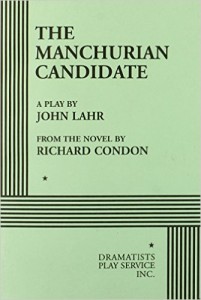 Fourth piece of detail: the stage play. The story was also updated and adapted into a stage play, by New Yorker theater critic John Lahr in 1993. (This is the play that was presented on the Camelot Theatre stage.) In Lahr’s telling of the story, the platoon was brainwashed while serving on a peace-keeping force in the Middle East. Shaw is brainwashed to become a killing machine on command, and is used by his evil conniving monster of a mother, Mrs. Iselin, to eliminate anyone standing in the way of the rise of the political career of her moronic puppet of a husband, Senator Johnny Iselin, ultimately to include the assassination of the President, as part of a “preposterous scenario involving a brain-washed killer and a plot to make Tokyo dependent on US oil by nuking the Gulf.” [Times of London] The red-baiting of Richard Condon’s novel is replaced by Japan-bashing, primarily given voice by the “cartoon buffoon” Senator Iselin.
Fourth piece of detail: the stage play. The story was also updated and adapted into a stage play, by New Yorker theater critic John Lahr in 1993. (This is the play that was presented on the Camelot Theatre stage.) In Lahr’s telling of the story, the platoon was brainwashed while serving on a peace-keeping force in the Middle East. Shaw is brainwashed to become a killing machine on command, and is used by his evil conniving monster of a mother, Mrs. Iselin, to eliminate anyone standing in the way of the rise of the political career of her moronic puppet of a husband, Senator Johnny Iselin, ultimately to include the assassination of the President, as part of a “preposterous scenario involving a brain-washed killer and a plot to make Tokyo dependent on US oil by nuking the Gulf.” [Times of London] The red-baiting of Richard Condon’s novel is replaced by Japan-bashing, primarily given voice by the “cartoon buffoon” Senator Iselin.
Unlike the 2004 film update, which was generally well received, the stage play was not universally loved by the critics.
“With precious little dramatic push to call its own, John Lahr’s adaptation of “The Manchurian Candidate” interests solely in answering the question of how a story best remembered as a brilliant film will be translated to the stage. The short answer: not very well. . . . [T]he play mostly serves to remind how infinitely superior John Frankenheimer’s 1962 Frank Sinatra starrer was. . . . Most damning of all, though, is that no modification of detail can modernize the Cold War temperature that chills Condon’s story. And why should it be otherwise? “The Manchurian Candidate” functions best as a satire of its times. Take away the times and you’re left with a not very thrilling thriller.” [Variety, Review: ‘The Manchurian Candidate’; http://variety.com/1994/legit/reviews/the-manchurian-candidate-3-1200437936/]
However, the Lahr stage play was not completely panned either.
“Nevertheless, there is much to recommend here. Lahr is arguably the nation’s best drama critic; his reviews for The New Yorker magazine demonstrate a rigorous intellect and a unique understanding among critics for the nuts-and-bolts of theater-making. Such knowledge gets applied to this adaptation, which is much more than mere movie homage–it’s a legitimate stage translation. If nothing else, such understanding makes “The Manchurian Candidate” a provocative, if flawed, intellectual exercise.
With Condon’s encouragement, Lahr has updated the setting from the 1950s to “sometime in the near future.” Now the kidnaped American soldiers aren’t in Korea but are members of a Mideast peacekeeping force. Instead of the Red Menace, Washington extremists are paranoid about a “menace” from Japan. . . . And the concept of a hit man under the control of a foreign government, assassinating politicians? No need to update that nightmare.
Nor does Lahr need to tamper much with Condon’s finest creation, a contemporary Lady Macbeth named Eleanor Iselin who devours her senator husband and war-hero son in the pursuit of political power.”[Los Angeles Times, THEATER REVIEW : ‘The Manchurian Candidate’, Richard Stayton, April 22, 1994, http://articles.latimes.com/1994-04-22/entertainment/ca-48901_1_manchurian-candidate]
You should be getting a sense now that the stage adaptation of The Manchurian Candidate is a flawed play. It lacks the thrill and impact of the Cold War era film, contains some implausible plot threads (the U.S. nuking the Middle East to make Japan dependent on U.S. oil?), and presents some overly ridiculous and cartoonish characters (e.g., Senator Iselin is depicted as a loud mouthed, hate mongering, idiot politician; but then, have you watched Donald Trump in this year’s Republican Presidential debates? Bet if you see this production, you’d rather vote for actor Jeff Golden’s Johnny Iselin). But it’s not without its virtues – the idea of an assassin under the control of a foreign power is compelling. The depiction of a modern day Lady Macbeth is both timeless and riveting. Unmentioned elsewhere, but central to the plot and most compelling for me is the struggle of the good soldier (Marco) to resolve his nightmares, stand fast in the face of the skeptics surrounding him, unravel the conspiracy, and act to block its success.
Now let us discuss the Camelot Theatre production. As I said at the outset, the cast delivers what amounts to a master class in fine acting. At the head of the class are a trio of seasoned actors: Mark Schneider in what I have just described as the pivotal role of career soldier Ben Marco, Presila Quinby in the rich role of the Lady Macbeth character, Mrs. Iselin, and Jeff Golden as the outspoken, opinionated, racist, but none-too-bright Senator Johnny Iselin.
Mr. Schneider is a much seen veteran television and screen actor, with a very long IMDb resume [http://www.imdb.com/name/nm0773937/?ref_=fn_al_nm_1] listing 38 TV and screen acting roles in scores of television series beginning with General Hospital in 1963 and including recurring roles in such chestnuts as Matt Houston, Santa Barbara, and Babylon 5, as well as film roles in pictures like Ghostbusters II, Son of the Pink Panther, Venus Rising, and the forthcoming 2015 movie, Obscura. He also has put in a lot of time on theatrical stages, in Southern California with L.A.’s Second City company, at South Coast Repertory, the Coronet Theater, the Callboard Theatre and the Actors Alley Theatre. More recently, he has been gracing the stages in Southern Oregon, in God of Carnage in Ashland, and previously appearing for Camelot Theatre in Sunset Boulevard. [See review at http://bit.ly/1GnbfIx] The stage adaptation of The Manchurian Candidate really succeeds or fails on the shoulders of the actor in the Marco role, who must sell the brainwashing concept to the audience, depict the profound emotional experience of the unseen nightmares, react in a credible but emotionally wringing way to the skepticism and disbelief of everyone around him, gain the sympathy of the audience in his difficult upward struggle to sort out the puzzle and confront the horror unfolding around him, while presenting the character as a down to earth, honest, virtuous, old fashioned soldier who is pressed by circumstance to be a patriot of the highest order.
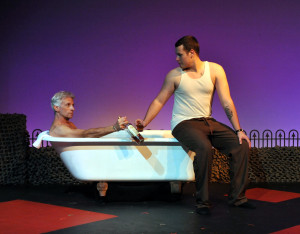
Ben Marco (Mark Schneider) wrestling with his nightmares about his platoon’s captivity, with the help of a bottle of liquor, in the bathtub at the apt. of Raymond Shaw (Aaron Garber).
Mr. Schneider does ALL OF THAT magnificently. His characterization of Ben Marco is believable, sympathetic and compelling throughout the show, and he shepherds the audience along through the story nicely and deftly. I have to say, I find his performance in the Marco role much more credible and superior to that of Frank Sinatra in the classic film. It’s a “must-see” performance – so go see it.
The larger than life, elephant-in-the-room character in this play, as in the films and the novel, is the Lady Macbeth simulacrum, Mrs. Iselin. The role won an Oscar nomination for Angela Lansbury in an almost unforgettable performance in the 1962 film. Camelot has cast Presila Quinby in the role. Ms. Quinby likewise has an extensive and interesting resume. She has performed on Broadway stages in productions of The Secret Garden and Meet Me in St. Louis, in numerous regional theater productions spanning the country from Springfield, MA to San Diego, CA, and since 2003 in the Rogue Valley, where she has performed roles for Camelot Theatre, Cabaret Theatre, Next Stage Theatre, Rogue Opera, and additional theatrical venues. For Camelot, she has previously appeared in Sherlock Holmes and the Case of the Christmas Carol, 1776, Spotlight on Mary Martin, Steel Magnolias, Dancing at Lughnasa, Sockdology, Inherit the Wind, I Remember Mama, Always. . . Patsy Cline, Crimes of the Heart and Sweeney Todd. Ms. Quinby also is the resident director for the Spotlight Series at Camelot.
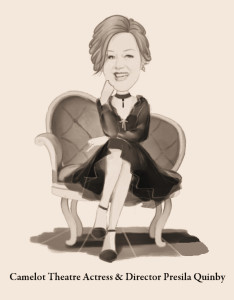
Caricature of Presila Quinby, who plays the role of Mrs. Iselin in Camelot Theatre’s The Manchurian Candidate
I am tickled to say that Presila Quinby succeeds in the Mrs. Iselin role on the Camelot stage, to an extent that almost makes one forget Ms. Lansbury’s film performance and certainly rivals that. The role requires great range and depth from an actress, with different scenes calling for projecting calculating, cool evil, childlike vulnerable innocence, universal maternal protectiveness, overt aggression, provocative sexual abandon (at least some innuendo of the illicit sexuality in the book is back in the stage play), and even an abrupt discomforting nosedive into complete desolation. Ms. Quinby does a very polished job of portraying all of those aspects of the Mrs. Iselin role. It IS a larger than life character, but Ms. Quinby makes her a real and believable one for the Camelot Theatre audience (not to mention her fellow actors on stage, who must play against her in rendering their characters).
The third member of the trio of seasoned master class actors leading this cast is Jeff Golden, chewing up the stage and stealing scenes while obviously having great fun in the role of the outspoken, opinionated, racist, but not-too-bright Senator Johnny Iselin. Mr. Golden is not just a seasoned actor; he’s a phenomenon, who has left his mark through a multitude of careers. He actually WAS a politician, and a successful one at that, having served as a Jackson County (OR) Commissioner, Chief of Staff to the Oregon Senate President, and Environmental Policy aide to the City of Portland. It is a tribute to his acting skills that as a real politician, he was nothing like the Senator Johnny Iselin character he plays in The Manchurian Candidate; if anything he was the polar opposite, a thoughtful erudite environmentalist, whose stand for responsible forestry earned him a nomination for the JFK Profile in Courage Award. In real life, he was the down to earth, honest, virtuous, old fashioned, principled hero personage presented by the Marco role in this story, and nothing like the brainless buffoon he plays to the hilt on the Camelot stage.
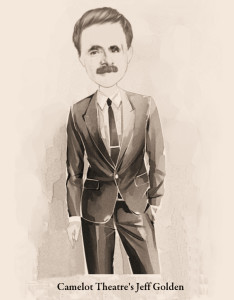
Caricature of Jeff Golden, who plays the role of Senator Johnnie Iselin in Camelot Theatre’s The Manchurian Candidate
Mr. Golden is also an accomplished author, having penned the non-fiction books Watermelon Summer (Lippincott & Co, 1971) and Forest Blood (Wellstone Books, 1998), and the novel UNAFRAID: A Novel of the Possible (Hellgate Press, 2008). He also has and continues to enjoy a career as a broadcaster. He hosted the popular daily NPR talk-show, The Jefferson Exchange for nine years from 1998 to 2007 and currently is producer and host of the weekly public TV and Internet program, Immense Possibilities, showcasing “social inventors” whose creations are “building vibrant communities” and “solving challenges that the old systems can’t”. And in his obviously abundant free time, Mr. Golden has been regularly flexing his acting muscles on the stages (past and present) of Camelot Theatre. He has appeared for Camelot as Zorba in Zorba!, King Arthur in Camelot, Matthew Harrison Brady in Inherit the Wind, Judge Haywood in Judgement in Nuremberg, and most recently as Cecil B. DeMille in Sunset Boulevard. [See review at http://bit.ly/1GnbfIx] The man can act and more or less does provide a master class in the craft on stage in The Manchurian Candidate.
Of course, the large cast (I counted 23 plus at least one uncredited cameo) of The Manchurian Candidate included more than just those three, and at the risk of repeating my introductory comments, there was not a sub-par performance among them. Several more deserve some acknowledgment. The role of Raymond Shaw, the character at the center of the story, was played by fresh young actor Aaron Garber. It’s not an easy role to play, as he must repeatedly lapse into a brainwashed, robotic controlled, emotionless and affectless automatron; it’s a heck of a lot easier for an actor to emote, than to NOT emote. But Mr. Garber pulled it off and made it believable. He deserves extra credit for really and truly enduring a not too pleasant experience with a mop bucket full of water and doing a fine job of depicting the ickiness of being on the receiving end of sexual advances from Shaw’s mother.
I absolutely loved Roy Von Rains, Jr.’s short but nearly over the top (pushed right to the edge, but not quite past) performance as the Manchurian Institute Doctor who conjured up all this madness.
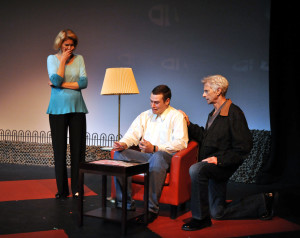
Eugenie (Barbara Henson) watches as Raymond Shaw’s (Aaron Garber) brainwashing is triggered by Ben Marco (Mark Schneider) in Camelot Theatre’s The Manchurian Candidate
In earlier productions, the character of Marco’s girlfriend, Eugenie and the actresses who’ve played her have been excoriated, e.g.,
“. . . one clinker after another. ‘Admit you’ve got post-traumatic stress syndrome and I’ll gladly help you cope with it,’ says Ben’s lover, Eugenie (Alicia Genetski). Poor Genetski is given a bigger hoot yet when, as the play devolves into unintentional camp during the assassination scene, her Eugenie spots the laser trained on Eleanor. ‘Hey!’ says Eugenie, ‘she’s got a red spot on her forehead!’” [Variety, Review: ‘The Manchurian Candidate’; http://variety.com/1994/legit/reviews/the-manchurian-candidate-3-1200437936/]
But Camelot’s actress in the Eugenie role, Barbara Henson, makes lemonade from the lemon handed to her, and gives a winning performance as a sympathetic, caring, support to Marco.
The effervescent, fresh Stephanie Jones, straight from playing the Cherie role in Next Stage Theatre’s Bus Stop, is perfectly cast as Shaw’s love interest, Jocie Jordan. Her acting in affectionate scenes with Shaw as well as with her doting father, Senator Jordan, is impeccable, credible and effective in moving the story along. That doting father, Johnnie Iselin’s opposite and nemesis: upstanding, restrained, dignified Senator Jordan, is well played by another veteran actor, Bob Clark, adding this supporting role to a long list of 30 years of film roles, episodic television parts, industrial film appearances and stage turns.
And exercising a bit of self-indulgence (actually, to be honest, this whole undertaking, writing reviews, is at the core a self-indulgence), I can’t resist giving a shout out to the actress who turned up in that uncredited cameo: Brianna Gowland, who most recently appeared in the comic role of Rosemary in Randall Theater’s Bullshot Crummond. Ms. Gowland, costumed as a cleaning lady, gets to wheel in that mop bucket full of water, and as I noted in a comment after the show, earns a positive notice for “not kicking the bucket” despite abundant opportunity to do so. Actually, I’m beginning to think Ms. Gowland may be some sort of lucky charm for Director Roy Von Rains, Jr. (yes, the mad Doctor responsible for the brainwashing also directed this production – had them ALL brainwashed!). It’s as though Von Rains has to find some way (credited or not) to get Ms. Gowland connected with every Camelot production he’s involved with, to placate the theater’s mystical haunting spirits.
As usual, Camelot Theatre supports the cast and acting with superior stagecraft. Video projection is used extensively and very effectively throughout the production. Every time a scene calls for a far off, exotic, or elaborate location, the action shifts to a projected video clip. Thus the Middle East infantry patrol excursion and the Manchurian brainwashing sessions in the earlier parts of the story are acted on video, as is the Madison Square Garden political convention sniper’s nest action near the end of the tale. It’s almost as if Camelot has turned this production into a hybrid adaptation – part stage and part film. But it works. It’s very effective. Major kudos awarded to Director of Photography and Video Designer Brian O’Connor. Sound is also handled well, also by Mr. O’Connor.
I can’t tell you EVERYTHING was perfect, however. I’ve already exposed the Lahr adaptation as flawed. Lahr’s script creates problems in another respect too. It presents 31 scenes, requiring 30 scene changes in just over 2 hours of stage time. That’s a daunting challenge. And a tough one to tackle in a theater which, unlike the Shakespeare Festival’s Bowmer Theatre, has neither a giant turntable nor a center stage elevator to use to change scenes and move sets around. The person seated next to me at the performance I attended voiced displeasure during intermission at the discontinuity and extended pauses posed by the many scene changes. I had to laugh when the same person complained that all the action seemed to be taking place at stage right or stage left, and very little was done in center stage. I said, “Look, its hard enough to get the necessary set elements and props (desk, lectern, restaurant tables, bathtub, etc.) on and off stage at the sides of the stage. You’re already complaining its taking too long. How do you want them to get that stuff to center stage without slowing the show down even more? Free drop from the rafters?”
So the verdict on Camelot Theatre’s The Manchurian Candidate in a nutshell: a superior cast presenting all-around first rate performances elevates a flawed adaptation of a compelling novel and film to a stimulating , notable, and worthwhile production. Performances of The Manchurian Candidate continue at Camelot Theatre, 101 Talent Avenue, Talent through November 8, Thursday thru Saturday 8:00 pm, Sunday Matinees 2:00 pm. For tickets: order online at http://bit.ly/1EO71aR, or call the box office at 541-535-5250, or in person at 101 Talent Avenue, Talent, Oregon.
